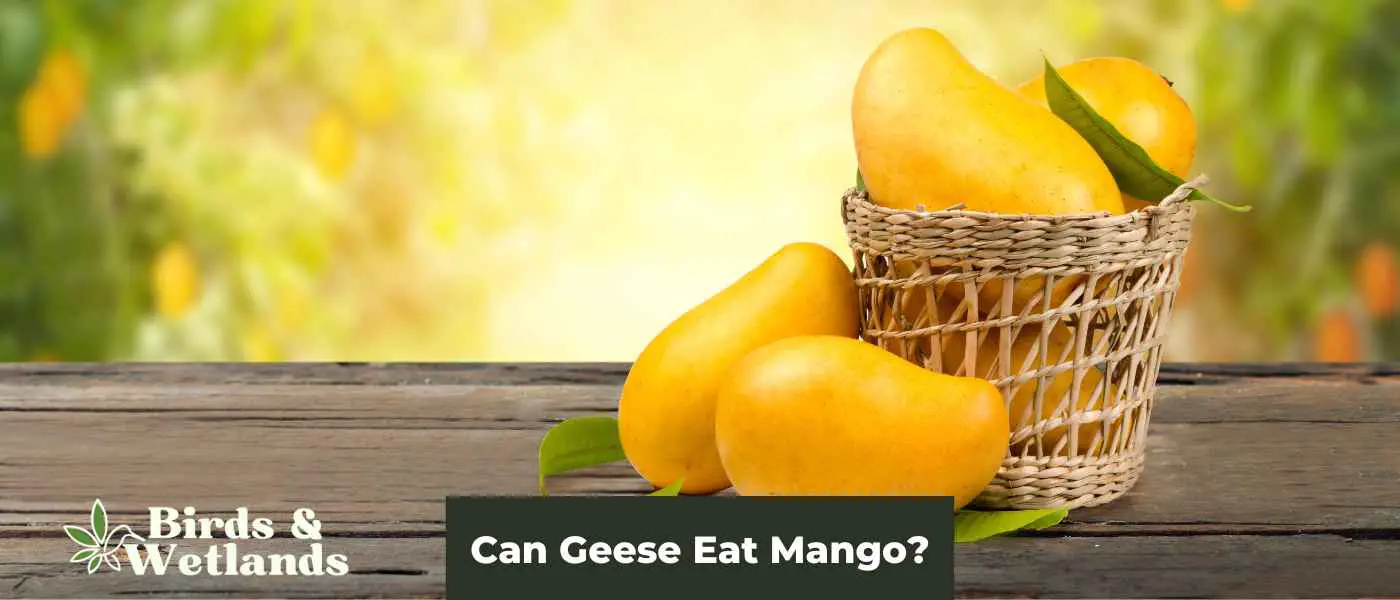Have you ever gazed upon a majestic flock of geese and wondered what they might enjoy munching on besides breadcrumbs? Well, get ready to have your mind blown by the answer to one of the most intriguing questions in the avian world: Can geese eat mango?
Mango, the sweet and juicy tropical fruit, is a staple in many human diets, but what about for our feathered friends? Is this fruit off-limits for geese or can they partake in its deliciousness?
Let’s embark on a journey of discovery, as we uncover the truth about the dietary habits of geese and explore the possibility of them indulging in this delectable fruit. So, buckle up and get ready to be amazed, as we dive into the world of geese and mangos.
Indeed, these water birds can enjoy this tasty fruit just as much as humans can.In addition to being delicious, mangoes are known to be low in calories and rich in vitamins. Mangoes are packed with vitamin C, beta-carotene, and potassium.
Key Points on Can Geese Eat Mango
- Geese primarily eat plant material and small animals but they also love snacking on a small piece of fruit such as mango.
- Mango is an excellent choice to add to the diet of your pet goose.
- While mangos are nutritious, feed them to your pet geese in moderation only.
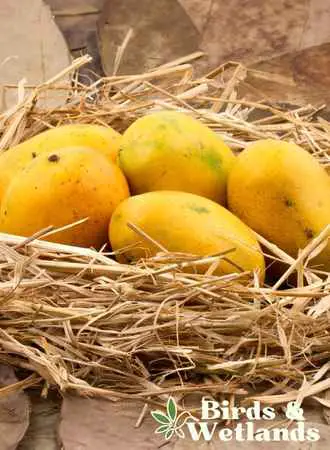
Can you feed wild geese mangos?
Yes, you can feed wild geese mangoes, but do so in moderation. In fact, mangoes are better than junk food and other toxic food like bread that people normally feed geese at local parks.
Mangoes are frequently referred to as a superfood, and with good reason. They’re high in vitamins, minerals, and antioxidants, which can benefit your health in various ways.
In fact, geese eating mangoes in the wild has become a problem for some mango farmers.
Mangoes are high in nutrients and helps prevent heart disease. Wild birds, such as geese, require various nutrients to keep healthy, and mangoes can be a good source of nutrition. The fruit is also low in calories, so it won’t add extra pounds to their already-heavy bodies.
Mangoes contain a good amount of fiber, which helps geese feel full and content after feeding, thus preventing overeating which can lead to weight gain. A fat bird will be at a high risk of predation because it will have difficulty taking flight.
On the other hand, junk food has little to no nutritional value. It’s heavy in calories but low in nutrients, which can lead to obesity and other health issues in the long run. Junk foods are especially difficult for a goose’s digestive tract and can cause diarrhea and vomiting.
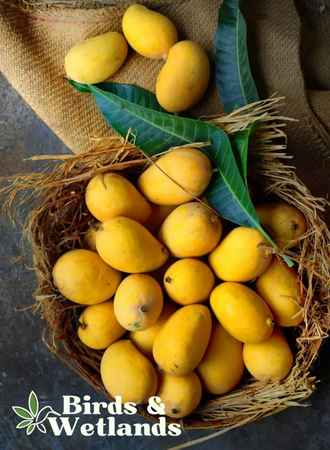
Can baby geese eat mangos?
The majority of a gosling’s diet consists of plants and insects. Even if they can consume a range of fruits and vegetables, it is crucial to feed them occasionally.
This is due to the high sugar content of many fruits, such as mangoes, which can induce stomach distress in young geese. Mangoes are also a choking hazard due to their huge size and tough pit.
For these reasons, you should only offer your gosling pitted and peeled mango pieces on rare occasions.
Can geese eat mango peels?
Geese can eat mango peels. Mango peels contain fiber, vitamins, and minerals, including calcium, magnesium, potassium, iron, zinc, vitamin C, riboflavin, and folate.
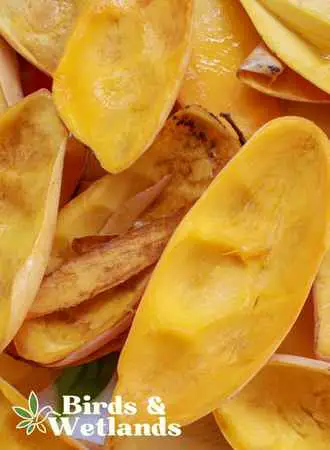
What are the health benefits of feeding geese mangos?
Mangoes are high in vitamin C, making them a perfect addition to your geese’s diet. Geese need more vitamin C than many other animals due to the fact they are susceptible to various avian respiratory diseases. Vitamin C helps to keep their lungs healthy.
Vitamin C is also required to create collagen, which is necessary to maintain the skin and feathers. Additionally, this vitamin helps the goose’s ability to absorb iron, which is required for the synthesis of red blood cells.
| Nutrient | Amount per 100 g | Benefit for Geese |
|---|---|---|
| Vitamin C | 25% of the daily value (DV) | Supports a strong immune system, as well as healthy skin and feathers |
| Vitamin A | 15% of the DV | Supports good vision and eye health, as well as the health of the skin and feathers |
| Fiber | 2g | Supports healthy digestion and helps regulate bowel movements |
| Potassium | 7% of the DV | Helps regulate fluid balance and supports proper heart and muscle function |
| Folate | 5% of the DV | Supports proper cell growth and development |
It’s important to note that the nutritional content of mangoes can vary depending on growing conditions and the variety of mango. Additionally, this table only provides a general idea of the nutrient content of mangoes and is not meant to replace veterinary advice for determining the best diet for your pet goose. Mangoes are also high in sugar, so it’s important to offer them in moderation as part of a balanced diet.
Are there Any Issues Feeding Geese Mangoes?
Feeding too much mango to geese can lead to several potential health problems, including:
- Digestive Issues: Overconsumption of mangoes can lead to digestive issues such as diarrhea and bloating, which can be uncomfortable for geese.
- Nutrient Imbalance: While mangoes do provide some nutrients, they are not a complete source of nutrition for geese. Feeding too much mangoes can lead to a nutrient imbalance and potentially cause health problems.
- Risk of Contamination: Mangoes are commonly exposed to contaminants such as pesticides and bacteria during growing, harvesting, and transportation. Feeding too much contaminated mango to geese can lead to health problems.
- Increased Sugar Intake: Mango is high in sugar and overconsumption can lead to health problems such as obesity and diabetes.
Therefore, it’s important to feed mango in moderation as part of a balanced diet and not as the only food option offered to geese. It’s always best to consult with a veterinarian or avian specialist to determine the best diet for your pet goose.
How often can geese eat mangoes?
Mangos are delicious and healthy but your geese should not be eating large amounts of these fruits. You can offer them as an occasional treat in small amounts at least twice a week.
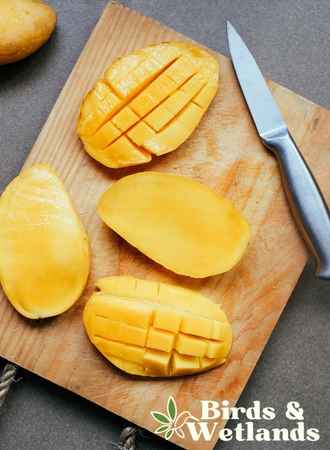
How to serve geese mangos
Many people enjoy feeding mangos to geese, but it is important to do so safely. Mango pits can be a choking hazard for small birds, so it is best to cut the fruit into small, bite-sized pieces before offering it to them.
Be sure to remove the pit and any other large seeds that could cause problems. Once the mango is properly prepared, geese will love eating it just as much as any other type of fruit.
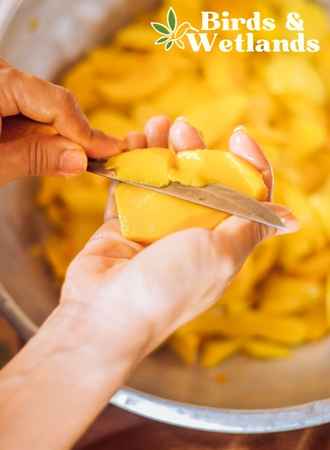
What other foods can you mix mangoes with?
For a good reason, Mango is a favorite fruit for geese and can be a good addition to their diet. It’s sweet, juicy, and high in nutrients.
Mangoes can get monotonous, so combining them with other fruits is generally beneficial. Apples, grapes, strawberries, berries and peaches are all excellent alternatives since they complement the sweetness of mangos. Oranges are another great option because the acidity balances out the sweetness. However, keep in mind that citrus fruits are acidic so offer them in moderation.
The lack of protein in mangos can be balanced out by giving geese protein-rich foods such as sunflower seeds, which may be an acquired taste. Some geese may not like the sunflower seeds like other bird species do.
Another good idea is to mix mangos with commercial feed and grains. Although geese love foraging, they enjoy eating commercial food mixed with small pieces of fruit. Leafy greens and other vegetables are also good choices to mix mangoes with.
Of course, many other fruits and foods can be combined with mangoes – the choices are practically limitless. So feel free to try new things and see what your geese prefer.

